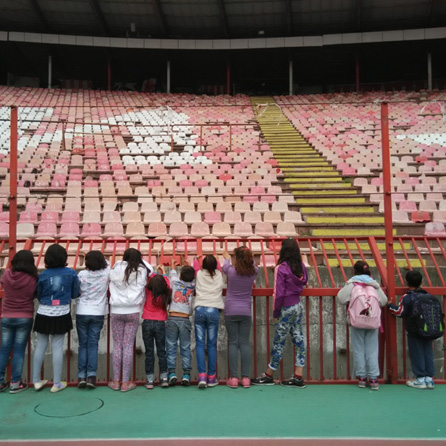Stories of Change

Drop-in Center attendants during one of the many CYI outings, in this case visiting a sports stadium. Photo: Center for Youth Integration
Literacy practice and homework assistance activities are conducted daily for the 50 to 70 children who come to daily drop-in shelters.
In Serbia, helping kids be kids
The CWS Children on the Move program is designed to provide care and social and educational inclusion for children living or working on the streets or other extremely vulnerable children in Serbia. This is implemented through our local partner, Center for Youth Integration. CYI operates drop-in shelters for these children. This is the story of a family whose children have benefited from that shelter.
The family of nine live in a house that is just over 320 square feet and has no bathroom. The family includes a mother, father, grandmother and six children. The family now sends four of its children daily to one of the drop-in shelters. But prior to finding a safe space within the shelter, the children had worked on the street for years, usually re-selling tissues and other cheap goods.
At the beginning, it was very difficult to approach the family. They were suspicious of outsiders. Adults and children often avoid any contact with “outsiders” for fear of them being representatives of state institutions and the risk of children being taken from the parents or being otherwise reprimanded. The father and grandmother were thus always present while children were working to keep an eye on them.
The children were afraid and mistrustful every time outreach workers visited them on the street where they worked. But the children were also ashamed if their schoolmates saw them working or if it was talked about in front of other students at school. It was very hard for them to find a place and time to feel safe and secure. They were constantly worried about the family’s finances, which no child should need to worry about. Because of this financial responsibility, they often missed school and every time they showed up in school it was even harder than the last time – having to catch up on the school curriculum and always lagging behind while other pupils were making progress. It was really hard for them, and they often felt excluded. They were constantly at risk of dropping out completely.
It took the outreach team more than 15 months of weekly visits to spots where the kids used to work until they succeeded in getting the children to visit the drop-in shelter and convince the parents to allow them to come. From that day until now, the children are coming to the shelter every day. With support from CYI staff, they are coping with homework, peer relationships and conflicts, and they are dreaming about a brighter future.
Ljupka is a really friendly 12 year old girl, and she has a few best friends in the shelter. She likes to take walks with her friends and to visit the concerts that are organized in a shopping mall in their neighborhood during weekends. She also likes fashion and hairdressing. Ljupka takes good care of her younger brother and sisters when their parents are not around.
Tanja is 11 years old and is their mom`s favorite. Or at least that’s how she tells it. She is a good friend and likes to be appreciated for that and for her outstanding sense of justice. She is regular at school and, like her classmates, she is trying to understand geometry and learn musical scales.
Joka is the youngest of the four. She is nine and looks up to her older brother and sisters who help her with homework because she takes school very seriously. Every time she comes to the shelter from school she is so excited to tell us daily news in detail.
Bole is a 14 year old who loves computers and IT. Now he is regular at school and would like to be a software developer. Thanks to our volunteers and supporters, Bole got an offer for a scholarship to a prestigious IT high school. He will be the first child among all beneficiaries of the past 10 years to attend such a prestigious school and one of the rare kids that will continue with education after primary school. His mother says that he is her prince.
Today, the parents are taking care of the financial needs of the family while the children focus on school and being children.
